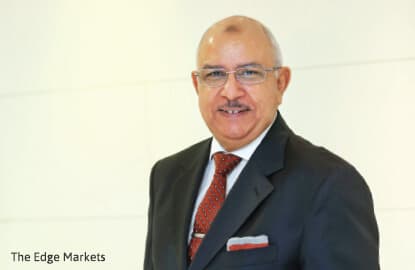
WHAT the Islamic finance industry needs next for its advancement is an equivalent to the International Monetary Fund (IMF) or rating agency Standard & Poor’s (S&P), says Professor Datuk Rifaat Ahmed Abdel Karim, recipient of the 2016 Royal Award for Islamic Finance.
Rifaat is currently the CEO of Malaysia-based International Islamic Liquidity Management Corp (IILM).
“In my opinion, we don’t have an equivalent to the IMF. Yes, we have the Islamic Development Bank [IDB], and it’s been doing a fantastic job. But I would say the IDB is more akin to the World Bank — it deals with poverty alleviation and things like that, but it’s not something that would address, for example, countries’ balance of payments, like the IMF does. If you want to take money [from the IMF], can you do it the Islamic way?
“We already have an Arab Monetary Fund, but we don’t have any single Islamic Monetary Fund. In my view, that’s an institution that needs to be established. How and where, I don’t know,” he tells The Edge in an interview.
The IMF is an organisation of 189 countries and one of its key mandates is to provide loans to member countries to address short-term balance of payment concerns.
The Arab Monetary Fund, set up in 1976, was designed to emulate the IMF, providing financing for its member nations experiencing balance of payment problems. Unlike the IMF, though, its loans are limited to its 22 members that are mainly Arab nations.
This is why Rifaat believes there is a strong case for setting up something more far-reaching.
He thinks it also makes sense to establish an equivalent of rating agency S&P.
“Well, there is already one [an international Islamic rating agency] in Bahrain. But the problem, as was highlighted to me by one of the central banks, is that it is owned by market players. What you need to have is [one] that is not owned by market players,” he says, pointing to how there could be potential issues that could arise relating to independence of the ratings assigned if the entity were to be owned by market players.
Rifaat was referring to Bahrain’s Islamic International Rating Agency (IIRA), which is sponsored by multilateral development institutions, banks and other financial institutions and rating agencies. It was set up in July 2005 to service capital markets and the banking sector in predominantly Islamic countries.
Rifaat was conferred the Royal Award by the Yang di-Pertuan Agong in Kuala Lumpur last Monday. This biennial Royal Award initiative, spearheaded by Bank Negara Malaysia and Securities Commission Malaysia, recognises individuals who have excelled in advancing Islamic finance globally through their contributions and achievements.
The past three recipients are Dr Abdul Halim Ismail, founding member of Bank Islam, Malaysia’s first Islamic bank (2014); Iqbal Khan, CEO of Fajr Capital (2012); and, Shaikh Saleh Abdullah Kamel, founder of the Dallah Al Baraka Group, one of the Middle East’s largest conglomerates (2010).
In Rifaat’s case, his contributions include his role in establishing two international standards-setting bodies — the Accounting and Auditing Organisation for Islamic Financial Institutions (AAOIFI) and the Islamic Financial Services Board (IFSB).
He was the first secretary-general at AAOIFI (1995 to 2002) and later at IFSB (2003-2011). AAOIFI produces the standards for accounting and auditing, while IFSB issues prudential standards for the industry.
In October 2012, he took over the helm of IILM, an international institution that was set up with the main aim of issuing short-term shariah-compliant tradeable financial instruments denominated in major reserve currencies to facilitate cross-border liquidity management among Islamic banks.
Under his stewardship, IILM issued the first, tradeable US-dollar denominated sukuk with a tenure of less than one year in 2013. That maiden offering, rated A-1 by S&P, represented a new class of assets in the Islamic financial services industry.
To date, IILM has issued and re-issued a total of US$21.14 billion (RM92.6 billion) of sukuk.
Rifaat believes the IILM has been effective in addressing the issue of liquidity for Islamic banks, but acknowledges that the market demand is “far bigger” than its sukuk issuances so far.
“What we have issued and re-issued up until the last auction is about US$21 billion. I think, every time we issue, we have been satisfying the market. The market demand is far much bigger than ours. In total, what you look at is the US$2.45 billion new issuance. But we also consider the re-issuance. Why do we call it a re-issuance, not a rollover? Because in every auction, we have a new price, a new size and a new allocation to our primary dealers... whereas, when you roll over something, you roll it with the same terms and conditions. In our case, that’s why we call it a re-issuance, and we are backed by long-term sovereign assets.”
The sukuk is tradeable because at least 51% of the assets in IILM’s portfolio are tangible in accordance with the ruling of the Islamic Fiqh Academy. “IILM is the only institution in the world that I am aware of that applies this Islamic Fiqh Academy ruling,” he shares.
Save by subscribing to us for your print and/or digital copy.
P/S: The Edge is also available on Apple's AppStore and Androids' Google Play.